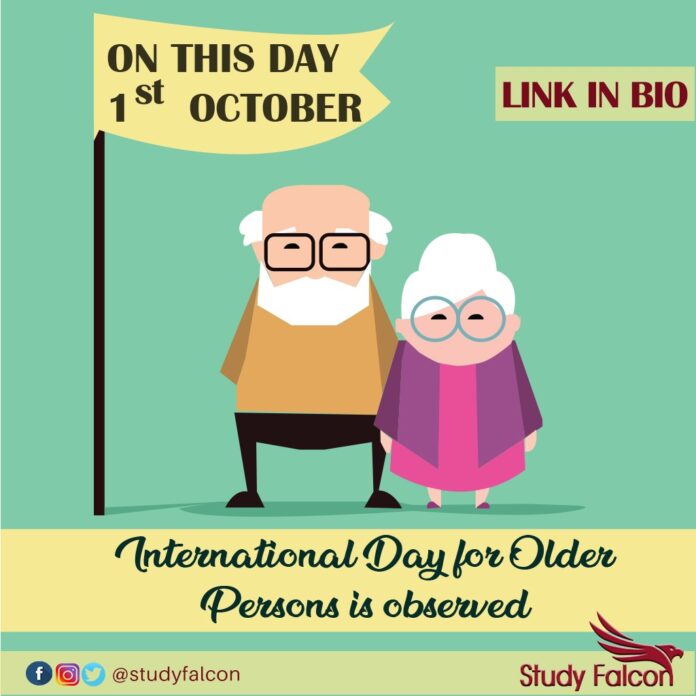The International Day of Older Persons is observed on October 1 each year.On December 14, 1990 the United Nations General Assembly voted to establish October 1 as the International Day of Older Persons as recorded in Resolution 45/106. The holiday was observed for the first time on October 1, 1991.It is a United Nations designated day to focus on the well-being of the elderly people.
This day is similar to National Grandparents Day in the United States and Canada as well as Double Ninth Festival in China and Respect for the Aged Day in Japan. The observance is a focus of ageing organizations and the United Nations Program on Ageing.
The World Health Organization (WHO), which is the UN’s directing and coordinating authority for health related issues, and other groups have been actively involved in promoting public awareness and attention on the International Day of Older Persons. Discussions are centered on topics such as: ageing populations and the provision of adequate healthcare for aged persons; volunteer work; social care; and ways to be more inclusive of older persons in the workforce.
To meet the challenge of an ageing world and Region, WHO continues to support countries to promote healthy ageing via a multisector, whole-of-society approach. The Region’s Framework on Healthy Ageing, which was adopted in 2018, highlights seven strategic elements that Member States have integrated into national strategies and plans. Key interventions include creating age-friendly environments, aligning health systems to the needs of older people and developing sustainable and equitable systems for long-term care.
The WHO says, the “Decade of Healthy Ageing” – 2020-2030 – is an opportunity to bring together governments, civil society, international agencies, professionals, academia, the media, and the private sector for ten years of concerted, catalytic and collaborative action to improve the lives of older people..
The UN General Assembly designated October 1 as the International Day of Older Persons on December 14, 1990. Prior to that there were two key developments – the Vienna International Plan of Action on Ageing and the World Assembly on Ageing. The two initiatives led to the dedicated day for the elderly people.
For the first time in history, 2018 saw people aged 65 and above outnumber children under five globally.
Senior citizens globally have been the worst-hit by the COVID-19 pandemic as experts have said. They are the most vulnerable with age-related comorbidities. In these unprecedented times, loneliness and mental health issues of the elderly people need special attention.
Some factor related to the 2020 theme:
- Increase awareness and appreciation of the role of the health care workforce in maintaining and improving the health of older persons, with special attention to the nursing profession.
- Present proposals for reducing the health disparities between older persons in the developed and developing countries, so as to ‘leave no one behind’.
- Increase understanding of the impact of COVID-19 on older persons and its impact on health care policy, planning, and attitudes.
- Raise awareness of the special health needs of older persons and of their contributions to their own health and to the functioning of the societies in which they live.
The year 2020 marks the 30th Anniversary of the International Day of Older Persons. This year has also seen an emergence of COVID-19, which has caused an upheaval across the world. Considering the higher risks confronted by older persons during the outbreak of pandemics such as COVID-19, policy and programmatic interventions must be targeted towards raising awareness of their special needs. Recognizing older person’s contributions to their own health and the multiple roles they play in the preparedness and response phases of current and future pandemics is also important.
This year has also been recognized as the “Year of the Nurse and Midwife”. International Day of Older Persons 2020 will highlight the role of the health care workforce in contributing to the health of older persons, with special recognition of the nursing profession, and a primary focus on the role of women – who are relatively undervalued and in most cases inadequately compensated.
The WHO logo is often seen on promotional material for the International Day of Older Persons. The logo is often featured in the color white on a mid-blue background. It shows a stereographic projection of the Earth centered on the North Pole under a serpent coiled around a staff. Two ears of wheat “cradle” the image. The projection symbolizes the global nature of the organization, while the serpent and staff are known to symbolize medical help and knowledge. Images of older people from different cultures and backgrounds around the world have been also used in UN promotional tools for the International Day of Older Persons.
The United Nations’ (UN) International Day of Older Persons is celebrated annually on October 1 to recognize the contributions of older persons and to examine issues that affect their lives.










